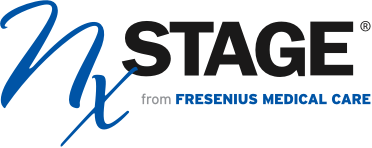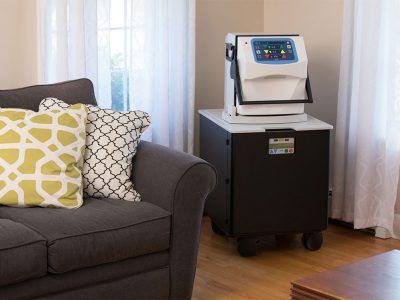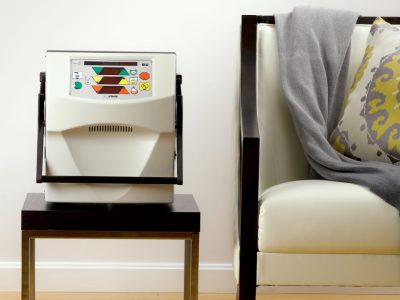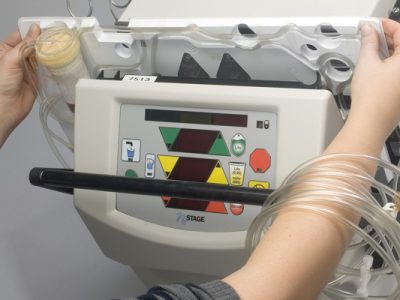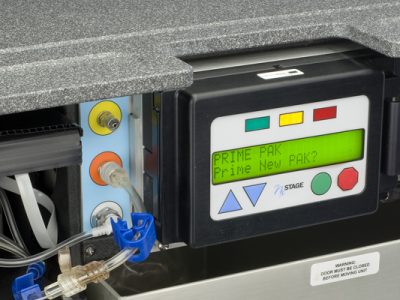The NxStage System One is designed as a simple and practical option for patients to perform hemodialysis therapy in the comfort of their own home.
Many healthcare professionals recognize the limitations of traditional in-center therapy, and accept that more frequent home hemodialysis may improve quality of life, patient outcomes, and survival.1-3 More than 90% of Nephrologists said they would choose a home dialysis therapy for themselves if informed they needed renal replacement therapy, with home hemodialysis being the preferred option.4
The NxStage System One is the only truly, portable home hemodialysis system that offers individualized treatment options that fit within your patient’s lifestyle; during the day, with or without a care partner, or, overnight as your patient and care partner sleep.
More frequent hemodialysis can offer patients access to life-changing benefits. Whether patients are new to dialysis or need to transition from their existing therapy, NxStage can help. Providing patient education on the types of therapies available can help you and your patients select the modality that fits their life and lifestyle.
By working together to explain all the modalities available to your patients including more frequent home hemodialysis, we can improve lifestyles and clinical outcomes for the growing number of dialysis patients today.
References:
- Finkelstein FO, Schiller B, Daoui R, et al. At-home short daily hemodialysis improves the long-term health-related quality of life. Kidney Int. 2012;82(5):561-569.
- FHN Trial Group. In-center hemodialysis six times per week versus three times per week. N Engl J Med. 2010;363(24):2287-2300.
- Weinhandl ED, Lie J, Gilbertson DT, Arneson TJ, Collins AJ. Survival in daily home hemodialysis and matched thrice-weekly in-center hemodialysis patients. J Am Soc Nephrol. 2012;23(5):895-904.
- Merighi JR, Schatell DR, Bragg-Gresham JL, Witten B, Mehrotra R. Insights into nephrologist training, clinical practice, and dialysis choice. Hemodial Int. 2012;16(2):242-251.
Risks and Responsibilities
The reported benefits of home hemodialysis (HHD) may not be experienced by all patients.
The NxStage System is a prescription device and, like all medical devices, involves some risks. The risks associated with hemodialysis treatments in any environment include, but are not limited to, high blood pressure, fluid overload, low blood pressure, heart-related issues, and vascular access complications. When vascular access is exposed to more frequent use, infection of the site, and other access related complications may also be potential risks. The medical devices used in hemodialysis therapies may add additional risks including air entering the bloodstream, and blood loss due to clotting or accidental disconnection of the blood tubing set.
Home hemodialysis with the NxStage System during waking hours may not require a care partner, provided a physician and a qualified patient agree that solo home hemodialysis is appropriate. Patients performing nocturnal treatments are required to have a care partner. Care partners are trained on proper operation and how to get medical or technical help if needed.
Certain risks associated with hemodialysis treatment are increased when performing solo HHD because no one is present to help the patient respond to health emergencies. If patients experience needles coming out, blood loss, or very low blood pressure during solo HHD, they may lose consciousness or become physically unable to correct the health emergency. Losing consciousness or otherwise becoming impaired during any health emergency while alone could result in significant injury or death. Additional ancillary devices and training are required when performing solo HHD.
Certain risks associated with hemodialysis treatment are increased when performing nocturnal therapy due to the length of treatment time and because therapy is performed while the patient and care partner are sleeping. These risks include, but are not limited to, blood access disconnects and blood loss during sleep, blood clotting due to slower blood flow and/or increased treatment time, and delayed response to alarms when waking from sleep.
Patients should consult their doctor to understand the risks and responsibilities of performing these therapies using the NxStage System.
